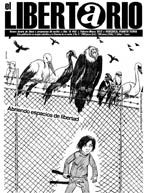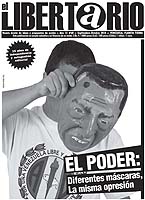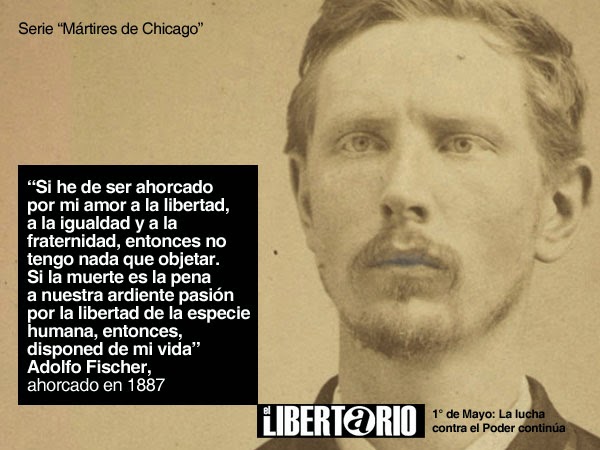Rafael Uzcátegui
As the Venezuelan situation changes every day, I
should clarify that I wrote this on 03/01/14 at 06:00 pm.
- Who are the people who took to the
streets? They are only upper middle class people of some housing developments,
militants of far-right parties and Colombian paramilitary activists,
("Aguilas Negras")?
- This question can only be answered correctly,
referring to the beginning of this cycle of protests in Venezuela. On February
4 students at the Universidad Nacional Experimental del Tachira (UNET), in San
Cristobal, staged a peaceful protest against insecurity, caused by the sexual
abuse against a student. The protest was brutally suppressed by the Bolivarian
National Guard (GNB), the agency of the Venezuelan Armed Forces in charge of
"maintaining public order", and 6 students were arrested. On this
episode we should clarify two things: 1) Historically the student movement in
Latin America and Venezuela, has always rejected detained students in protests
and 2) San Cristobal, capital of Tachira state, is a city located in a border
area with Colombia that has been particularly hard hit for several years by
interruptions of utilities (water and electricity mainly), price inflation as
well as shortages of various consumer products. The arrest of these students
led protests in other cities of the country, which in turn were suppressed by
increasing the number of students arrested. This created an
"snowball-effect", from the inner cities of the country to Caracas. It
is in this climate of protests and unrest, which two opposition politicians
(Leopoldo Lopez and Maria Corina Machado), make a call to hold demonstrations
to demand the resignation of President under the slogan "the exit".
It is important to say that the rest of the opposition
parties, including the coalition "Bureau of Democratic Unity" (MUD),
and the governor of Miranda state, Henrique Capriles; rejected the first few
days the protests, which have overwhelmed the political parties opponents. When
I write these answers (03/01/14) the protest against the government was
decentralized, with some violent foci but largely, peacefully. It also has two
different dynamics : One in Caracas , starring with middle class students from
public and private universities territorially in the east of the city, and
basically with political demands (release of the students, the resignation of
President and rejection of repression); and in the rest of the country,
qualitatively more important than that one in
Caracas because it incorporates popular sectors; and in some cities,
(such as San Cristobal), rural areas (thus this city was militarized), and
including social demands and lack of products, the high cost of living and lack
of basic services.
- What is the government's response,
(the level of repression) ? It is said that it finally has been very soft,
forgiving and respectful of human rights. Truth or propaganda?
- Propaganda. The reality is that when I answer this
(there are new events every day), there are 17 people murdered in the context
of demonstrations, 8 of they - including the first three - that it have been
shown were killed by state security agencies. During protests at the national
level , have been arrested over 500
people, and there is plenty of evidence of torture, cruel, inhuman and
degrading treatment of detained protesters, plus the number of people injured
by firearms, shots and shots to the body of tear gas. The amount of pictures
and videos taken by the protesters themselves has forced the government to
recognize their responsibility in the killing of manifestants, and there are
several members of the GNB arrested for authorship of the shooting. A novelty
is the use of paramilitary groups to suppress the protests, that have been
armed by the government, and act with tolerance and coordination of military
and police forces. I personally know, right now, some people who are out of its
house after being beaten and threatened with death by these paramilitary
groups....
- What is the popularity of Maduro
now?
- Maduro, unlike Chavez, is a very weak president
internally in the Bolivarian movement. Already been receiving heavy criticism
for making a economic adjustment program earlier this year, devalued the
currency, increased some taxes and has allowed to the end of 2013, a 50 %
inflation. For a political observer in Venezuela, right now, occurs a very
interesting phenomenon: While the opposition is mobilized in protests, the
basis of Chavismo doesn´t perform public acts supporting the government as
happened during the years of President Hugo Chavez. The strong repression of
the protests is rejected by large sections of Chavismo basis, who also knows
that there is a malaise due to the economic crisis. The few marches by Nicolás
Maduro, - exclusively in Caracas - only been able to mobilize public officials
and beneficiaries of social policies.
- The Western media connect the
opposition to current scarcity and insecurity. This is reality?
- First, the polarization of the international media
about the Bolivarian government remains the same as in recent years , but
inwardly in Venezuela the bourgeoisie of Chavismo has been purchasing media
since 2002 , so there is now a lot of censorship in TV channels nationwide ,
and many pressures on radios and newspapers. There is a deep economic crisis
and economic adjustment program is doing pay the costs of the crisis to the
country's workers. Regardless of how you end this wave of protests, the government
of Nicolas Maduro will continue to implement a package of economic measures
that affect all people, especially those with limited resources .
- Why a country with a big oil
wealth is facing daily shortage of the food?
- The government of Hugo Chavez, and now Nicolas
Maduro, has deepened the role assigned to Venezuela by globalized capitalism:
Sell oil, gas and other minerals to the global economic market, with the help
of transnational companies. The real U.S. embassy in Venezuela is called
"Chevron", whose chief business manager for Latin America Ali
Moshiri, said dozens of times that "he has not had any trouble doing
business with the Bolivarian government". Venezuela sells power to other
countries and is importing 80 % of products consumed in the country. As never
before the economy depends on the dollar, so having the right contacts in
government for receive dollars to the official price, makes possible duplicate
that money by 8 times, in few minutes, taking those dollars to black currency
market. The dollar has created a "parasitic Bolivarian bourgeoisie"
of state, whose main business is to receive money for imports.
- Is it true that there is a
conspiracy of businessmen and traders to hide food in warehouse?
- I'm not going to defend a businessman, and surely
there are many criminal entrepreneurs, like thieves in other sectors of an
economy that depends on the state. But this isn't the main reason for food
shortages in the country, what the government called "economic
warfare". Two facts: 1 ) The two state food distribution chains (PDVAL and
MERCAL), suffer the same level of food shortages that private companies, 2) The
largest and most important private entrepreneur of country food sector, Lorenzo
Mendoza, has met several times with President Maduro to increase production ,
which is a public and notorious news.
- Beyond the partisan blinders, are
we not also watching the decline of oil revenue system? What is the
responsibility of the Chavista state to this corruption?
- President Chavez himself called his project
"oil socialism", regardless of the social and environmental
consequences of the production of oil, gas and mineral resources for rural and
indigenous communities. In fact the so-called "Patria Plan", in the
plan of government of President Maduro, states to double by 2019 energy
production in the country. Oil money, managed by the state, has corrupted
social movements, who have given up independence and autonomy for receive a
little bit of oil revenues. In a tight and short review, during the past 15
years power conflicts between the government and the opposition, can be
characterized like as a clash between two bourgeoisies equally capitalists , in
order to control oil revenues.
-Where are the social reforms and
the fight against poverty? They are deepened sufficiently?
- Due to the increase in oil prices in the
international market, the government of President Chavez, counted, during 2004
and 2009 with higher state's revenues in Venezuelan history the last 30 years.
Despite having so high income and political control of the country, structural
reforms were not made to causes of poverty in the country. From 2005
compensatory social policies were promoted, called "missions" that
had a positive impact on the living standards of the poorest sectors of the
population, in that way, they had a greater purchasing power of products, with
the paradox of not leaving poverty. However, these "missions", were
sustainable only with a high foreign exchange earnings, as a result of high oil
prices on the world market. Since two years, these policies have been phased
out or have been stagnated. An example today is the disastrous situation of the
network of public hospitals in the country that do not have the equipment,
infrastructure or medicines to cure different diseases of the population. This
has led to a paradox within the government that calls itself
"socialist": In the absence of an effective public health system, all
state employees are insured for hospitalization, surgery and maternity in private
sector's clinics.
- What is the real level of threat
to the ultra-liberal right? Can you say that there is an attempt to destabilize
the power?
- To that question, several comments as a response: 1) The opposition is divided and internally
facing, and today doesn't have a unanimous position on street protests : One
sector supports it and the other one simply criticizes it 2) Venezuela is in
the process to transition towards
"something else", because of the physical absence of Hugo Chavez,
that some political analysts call "postchavismo". Regardless of how
that transition could be completed and how these protests finalize, there is no
way that the Bolivarian movement, broadly defined, is be completely displaced
from power. Chavez has a wide base of support making it a major player in the
short and medium term policy in Venezuela. So the result , now or later, will
be the negotiation between a sector
"Chavista" and another part of the "opposition "
when necessary to ensure the country's governance; 3) In 2002 began a purge of middle and senior
cadres of the army in Venezuela , so today the Armed Forces are committed to
the Bolivarian government project, not only for ideological reasons, but also
for economic. Never before have the military, who now exert numerous positions
in the public service, have had controlled so many legal and illegal businesses
in the country (for example, control of the ports for imports and exports of
good ). For this reason there are so many possibilities that a "right-wing
coup" - linked to opposition sectors - as a coup "left-wing" - a
sector of Chavismo against Maduro -. In conclusion I must say that we the
anarchists, along with other sectors of Venezuelan revolutionary left, equally
reject the government and the opposition political parties, trying to build a
social alternative, which in this case is called "libertarian". At
this time we have denounced the government crackdown on protesters and the
implementation of a package of economic measures has been downloaded on the
shoulders of the people, the crisis created by government corruption and the
old and new bourgeoisie in the country.



















































No hay comentarios:
Publicar un comentario
Nos interesa el debate, la confrontación de ideas y el disenso. Pero si tu comentario es sólo para descalificaciones sin argumentos, o mentiras falaces, no será publicado. Hay muchos sitios del gobierno venezolano donde gustosa y rápidamente publican ese tipo de comunicaciones.